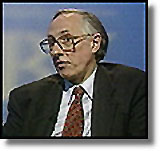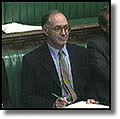
|
First Steps Towards DevolutionMPs have taken the first step towards establishing self-government for Scotland and Wales, with the start of the debate on the Government's devolution proposals.Donald Dewar, the Scottish Secretary said Scotland and Wales should have assemblies "to welcome the new Millennium". Mr Dewar said democracy in Britain was "in disrepute" and action was needed to combat general cynicism in the country. The Scottish Secretary was opening the two-day second reading debate on the Referendums Bill which paves the way for the devolution referendums in Scotland and Wales. Under the provisions of the Bill, which is the first piece of legislation to be introduced by the new Government, the Scots would be asked two questions. Firstly whether they want a Edinburgh parliament and secondly whether they want it to have tax-varying powers. The Welsh will just be asked whether they wanted an assembly, or Senedd, in Wales it will have no tax varying powers. The Conservatives are bitterly opposed to the Government's proposals which they believe could lead to the break-up of the United Kingdom.
He asked if it was right that Scots and Welshmen living outside their homelands should be disfranchised in the referendums and whether it was fair for the rest of the UK to be left unconsulted about a "profound" change to its government. Mr Howard asked about how devolution would affect the position of the Scottish and Welsh secretaries, "How will they occupy themselves in Cabinet. Will they make the tea? Do some photocopying? Or will they just sit there sniggering together like middle-aged versions of Beavis and Butthead?" Mr Howard was joined in his attacks by the veteran Labour opponent of devolution and the original framer of the West Lothian question Tam Dalyell. Mr Dalyell said if the Scottish parliament was to be a lasting institution, "awkward matters like the West Lothian question asking why Scottish MPs should have the right to vote on matters affecting England, while their English counterparts did not enjoy similar rights north of the border, had to be answered." Referring to the Government's plans to hold the referenda before fully drafting the Bills Mr Dalyell said the Government had to ensure that people knew the details of what they were voting on. Mr Dalyell said, "If there is a Referendum that takes places on a settled set of proposals after it has been through the Parliament mill then this gives it an entrenchment and at least a chance of success that it would not otherwise have." Liberal Democrat MP, Jim Wallace, criticised the Government's departure from the proposals of the Scottish Constitutional Convention agreed between Labour and Liberal Democrats. He said the Government had become "attached to the prospects of a referendum" because it "got the wobbles over tax". "Out of that came the two question referendum. It was not a policy born of principle, it was a policy born of expediency," he said. Mr Wallace said there had been a "clear consensus" in favour of a Scottish parliament, a mandate voted on May 1 and no need for the delay of a referendum but conceded the referendum was "merely a surmountable hurdle for the home rule parliament for which my party has campaigned". He also argued against calls from the Scottish National Party for an independence question to be put in the referendum, saying, "People had a clear option of independence on May 1." |
Diana, Princess of Wales, 1961-1997
Conference 97
Devolution
The Archive
News |
Issues |
Background |
Parties |
Analysis |
TV/Radio/Web
Interactive |
Forum |
Live |
About This Site
News |
Issues |
Background |
Parties |
Analysis |
TV/Radio/Web
Interactive |
Forum |
Live |
About This Site
© BBC 1997 |
politics97@bbc.co.uk |

